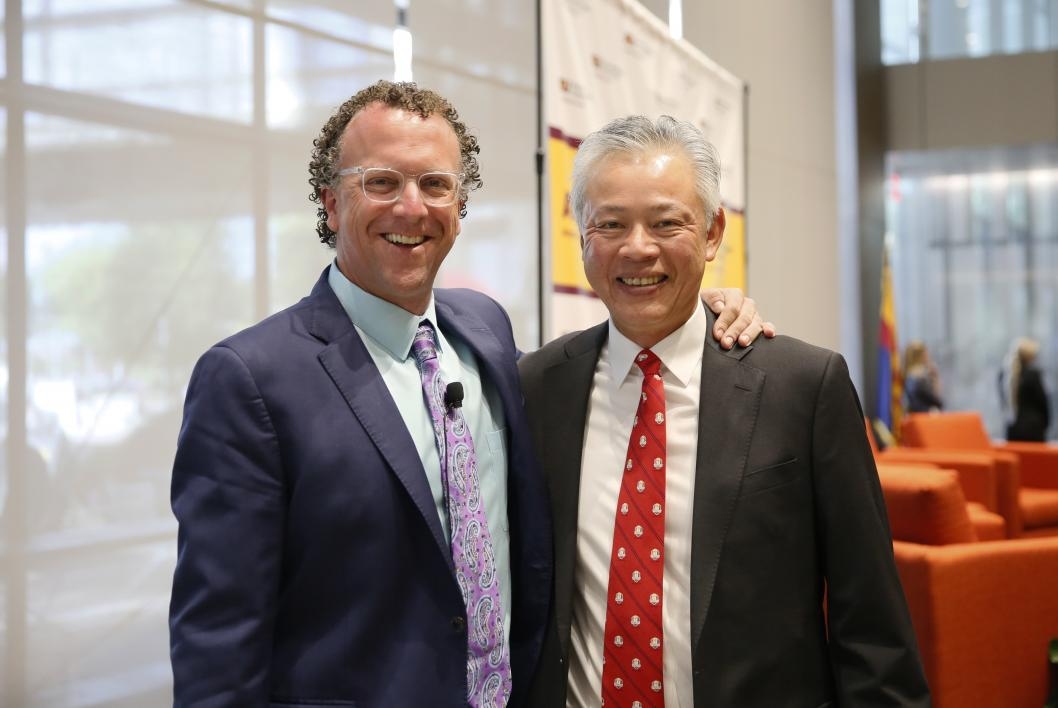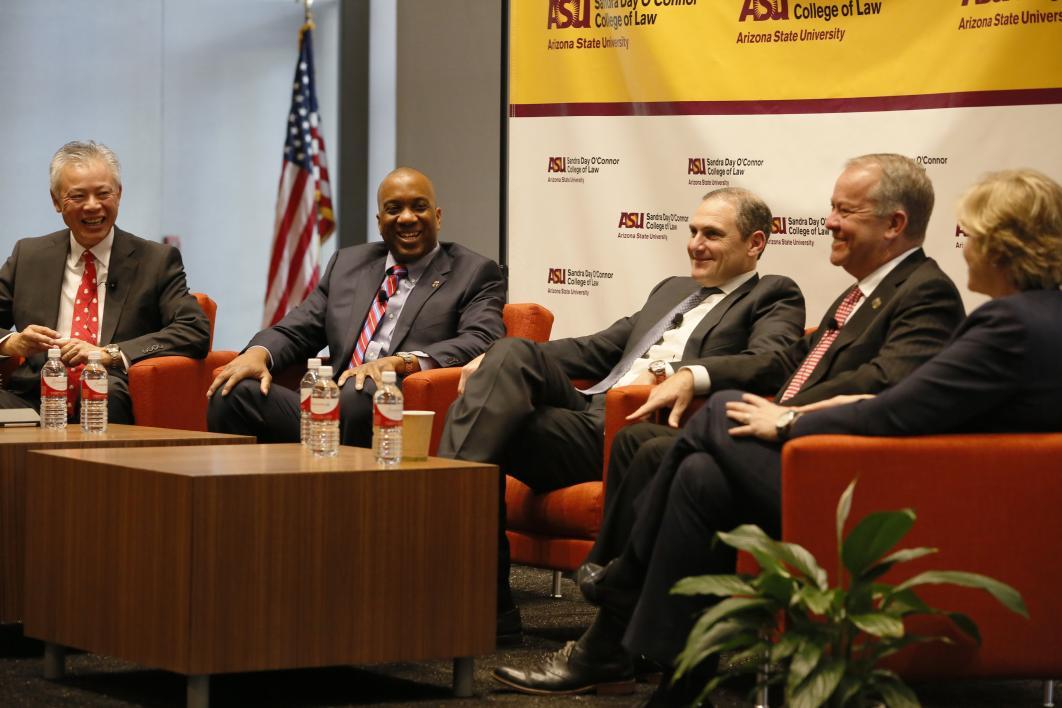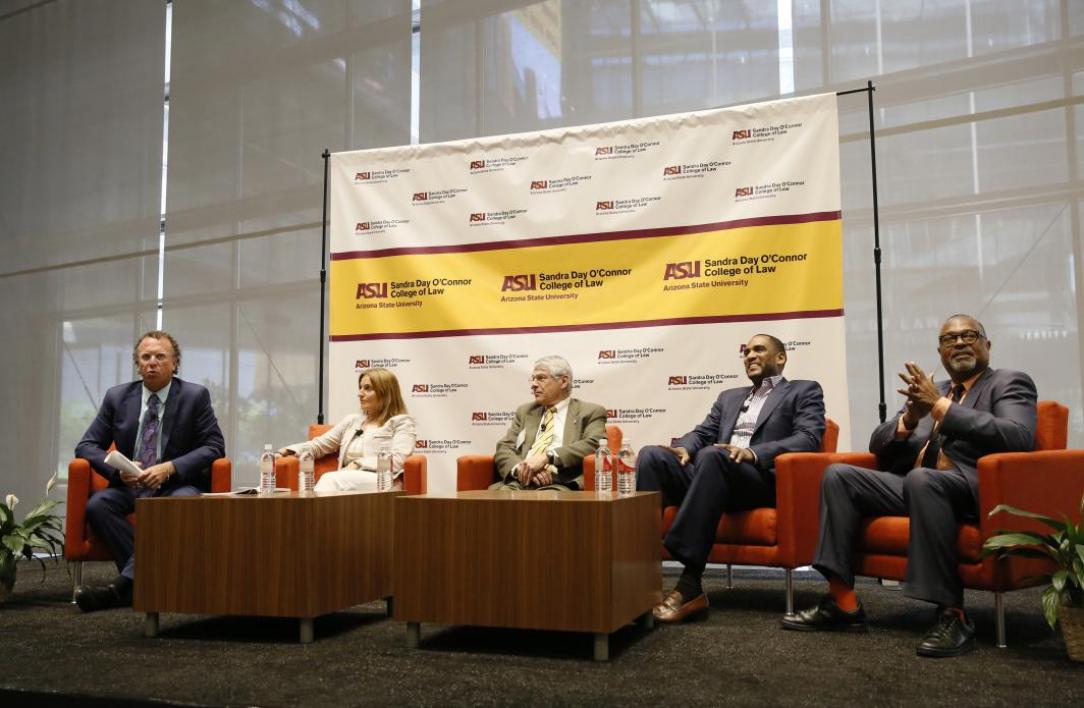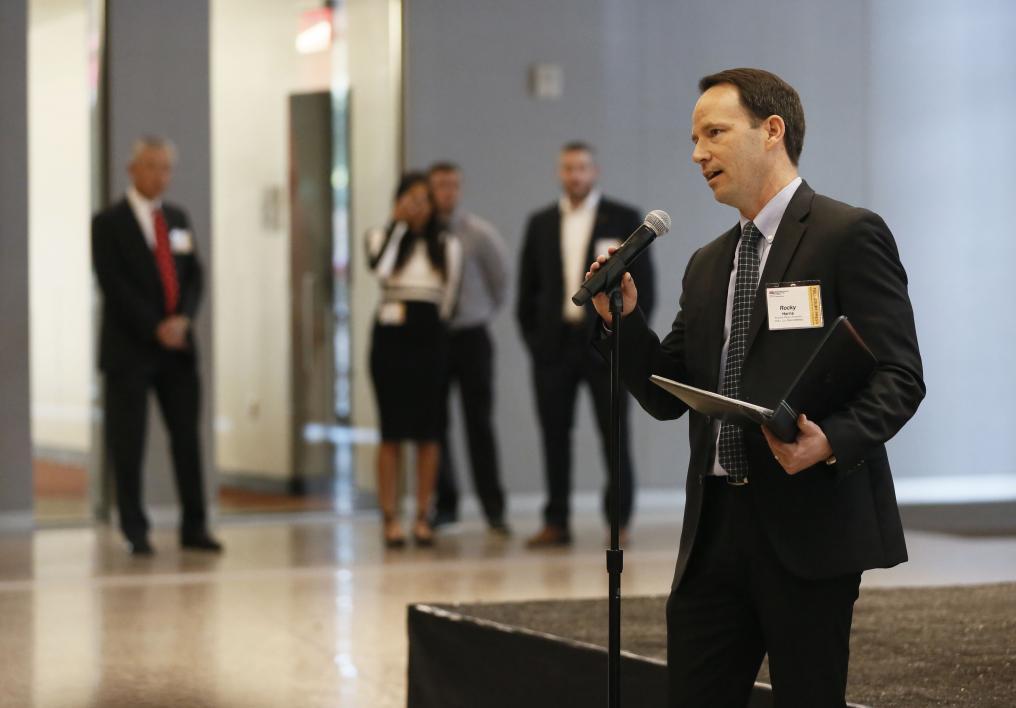March Madness brings collegiate sports discussion to ASU

(From left) Moderator Abraham Madkour, Gene Smith, Renu Khator and Gordon Gee speak about the state of collegiate sports at the "Full Court Press: Media, Autonomy, and the Future of College Sports" symposium April 3 at the Beus Center for Law and Society on ASU’s Downtown Phoenix campus. Madkour is the executive editor of the Sports Business Journal, Smith is a former ASU athletic director and now serves in the same position at Ohio State University, Khator is the president and chancellor of the University of Houston, and Gee is the president of West Virginia University. Photo by Lynn French/ASU
Editor's note: Read an overview about the symposium here.
The morning before the national title tilt between North Carolina and Gonzaga, during Final Four weekend, Arizona State University’s “Full Court Press” symposium hosted nearly a dozen of the nation’s top collegiate athletic minds. Organized by the Sandra Day O’Connor College of Law’s Sports Law & Business Program, “Full Court Press” delved into the issues facing college athletics, including the role of athletics in institutions’ missions, the NCAA’s new “autonomy” governance structure, and the entwinement of media in the fabric of campus sports.
After Sun Devil Athletics' Chief Operating Officer Rocky Harris gave the symposium’s opening remarks, the attendees were treated to panels featuring three university/college presidents; three Division I athletic directors; a Power 5 conference commissioner; and other noted collegiate athletics thought leaders.
Panel 1 — A Conversation on Sports
Moderator Abraham Madkour (executive editor, Sports Business Journal) and panelists Gordon Gee (president, West Virginia University), Renu Khator (president, University of Houston) and Gene Smith (director of athletics, Ohio State University).
The first panel took on the topic of the state of the NCAA and collegiate athletics and the key differences between Power 5 (Pac-12, Big 12, Big Ten, ACC, SEC) and non-Power 5 schools.
The consensus was that what set the Power 5 apart from the non-Power 5 was national perception, fan engagement and alumni support. Although the Power 5 conferences have expanded marginally over the past decade or so, the panelists hypothesized that regional mega-conferences — perhaps with two dozen or more schools — may be where Division I is headed.
Looking ahead, the panel saw 2024-25 as a potentially key period for schools, as that is the expiration date for many of the conferences’ current media rights agreements. The agreements struck thereafter will be a true litmus test of the media’s role in college athletic department finances.
Shifting gears, moderator Madkour asked each of the panelists for one change they would like to see from the NCAA. Simplifying the NCAA’s voluminous rulebook was one of the proposals, as was further reforming the transfer rules to limit the number of waivers granted to athletes.
The discussion also touched on schools’ Olympic, or non-revenue, sports, which all panelists agreed should be sponsored judiciously, but their accomplishments celebrated nonetheless.
Prior to concluding, Madkour asked each of the panelists what they believed were the most serious challenges facing the NCAA and its institutions. The answers included: Title IX compliance; freedom of expression and campus inclusion; athletes’ mental health; and increasing opportunities for athletes to interact with athletic departments and university leadership.
The panel ended with some quick hitters, with each panelist explaining how intercollegiate athletics could improve. Themes touched upon included telling the university’s story (one that emphasizes the transformative power of education) and not allowing athletic programs to become a liability as the result of compliance-related issues.
Panel 2 — The Power of Autonomy: What the Future Holds
Moderator Glenn Wong (executive director, Sports Law & Business Program, Sandra Day O’Connor College of Law at ASU) and panelists Janet Judge (president, Sports Law Associates), Mark Hollis (athletic director, Michigan State University), Larry Scott (commissioner, Pac-12 Conference) and Keith Gill (athletic director, University of Richmond).
A review of the Power 5 conferences’ move toward greater governing autonomy dominated the discussions during this session with a diverse set of interests and perspectives represented on the panel.
Pac-12 Commissioner Larry Scott recapped the history of autonomy’s formation and practice, stressing that the Power 5 sought greater legislative power in order to better respond to the pressures (both financial and legal) institutions were facing.
“The autonomy structure has been successful so far, with progress on scholarships, concussions, access to agents, and time demands,” Scott explained. He was also quick to dispel the notion that conference realignment was over and his photo with Khator after the panel sparked rumors about Houston’s potential conference destinations after being spurned by the Big 12.
Michigan State Athletic Director Mark Hollis, chair of the NCAA’s Men’s Basketball Committee, emphasized that all of the policies enacted under the autonomy structure were geared towards graduating athletes at a higher rate.
There was also discussion on athletes’ contact with agents. Hollis was wary of allowing current college athletes to have relationships with agents or advisers but conceded that athletes needed more resources to make wise decisions regarding their professional careers.
Keith Gill, the athletics director at the University of Richmond, brought a refreshing outsider’s perspective to autonomy, stating that his main concern with the Power 5’s move towards autonomy was the messaging that had come out of its legislation.
“The country needs to know,” Gill said, “that while non-Power 5 institutions may not have the same resources as the Michigan States of the world, they still care deeply about the health, safety and well-being of their athletes.”
Gill admitted that there is some concern about a complete Power 5 secession from the NCAA, saying that there may come a point of reckoning where institutions will need to decide whether their shared values is enough to keep them together.
Renowned sports attorney Janet Judge rounded out the panel and provided a unique perspective on autonomy and its effects. Judge noted that the external pressures referenced by Scott, namely litigation, are not going away anytime soon and schools will have to continually adapt. She also cautioned that any steps taken by the Power 5 to alter athletes’ compensation — like the cost-of-attendance legislation — would have Title IX implications. Judge was keen to note the revenue disparities between the Power 5 and non-Power 5 schools, saying that in her experience, facilities and personnel are the two main areas in which non-Power 5s struggle to maintain pace.
Toward the end of the session, the panel had an interesting discussion on athlete-agent contact. The consensus: Athletes struggle to find an objective voice advising them on their professional sports aspirations, and thus more resources should be provided to athletes making decisions on whether to turn pro or return to school.
Panel 3 – Media and the Madness: The Next 15 Years
Moderator Abraham Madkour (executive editor, Sports Business Journal) and panelists Gary Roberts (president, Bradley University), Hania Poole (vice president/general manager, NCAA Digital, Turner Sports), Kenneth Shropshire (The Wharton School, University of Pennsylvania) and Steve Smith (basketball analyst).
The final panel of the “Full Court Press” symposium touched on the integration of virtual reality into the college basketball fan’s viewing experience. The panel noted the future of VR will be a subtler, more seamless experience. But with the pace at which technology is evolving, it is difficult to predict how consumption preferences will change over the next 15 years. What is clear, however, is that the TV market has reached full saturation, and that moving forward, there will be a greater proliferation of digital consumption sources.
On the topic of college basketball, the panelists wished that March Madness didn’t coincide with schools’ spring breaks, because having more students on campus would be great for the games. Poole noted that schools have seen declines in student attendance, which is perhaps indicative of the millennial generation’s expectations in sports consumption. The tournament, the panel explained, was a positive escape for society, allowing individuals to step away from all else that is happening in the world and follow their favorite teams or alma mater.
Madkour then led the panelists into a discussion of a possible group license for universities’ use of athletes’ names, images and likenesses. The group was tepid on the idea and raised several concerns, including whether players on the same team would be compensated equally. Roberts said that the idea of athletes negotiating their own licensing deals was untenable, with Smith commenting that he doesn’t believe he should’ve been compensated for his time spent at Michigan State, as he was simply playing for the love of the game.
On the issue of the Final Four’s venue, the panelists agreed that despite the problem cavernous football stadiums pose for fans and players alike, it is unlikely that the NCAA will ever revert the Final Four back to a traditional basketball arena. The opportunity to generate ticket revenue is simply too powerful an incentive.
On the equitable treatment of college athletes, the panel noted that the talent — the players — receive just a small sliver of the revenues they help generate, while a majority of the profits flow to coaches and administrators.
In keeping with the “media” theme, Madkour had the panelists address the decreased attention women’s college sports usually receive in the press. The group wondered aloud whether this was due to a lack of consumer appeal, or the media itself turning a blind eye. Nevertheless, the panelists agreed, women’s college sports need greater promotion.
— Recapped by Amy Darlington and Cameron Miller, 1L students in the Master's of Sports Law & Business Program
More Law, journalism and politics
Can elections results be counted quickly yet reliably?
Election results that are released as quickly as the public demands but are reliable enough to earn wide acceptance may not…
Spring break trip to Hawaiʻi provides insight into Indigenous law
A group of Arizona State University law students spent a week in Hawaiʻi for spring break. And while they did take in some of the…

LA journalists and officials gather to connect and salute fire coverage
Recognition of Los Angeles-area media coverage of the region’s January wildfires was the primary message as hundreds gathered at…





